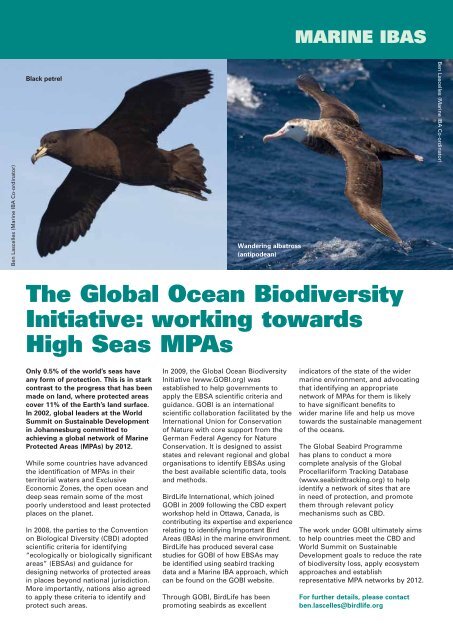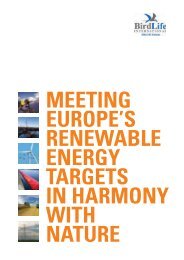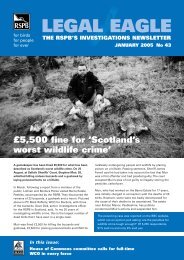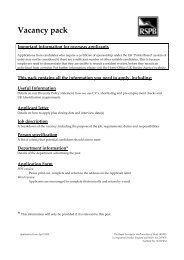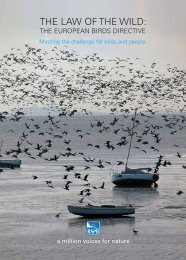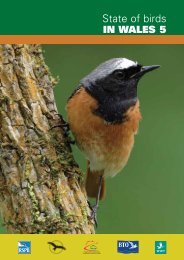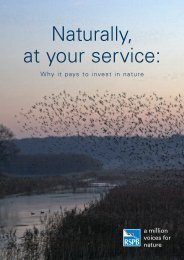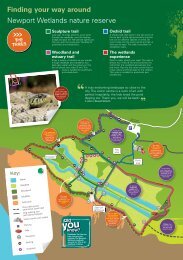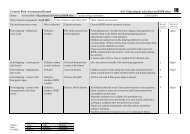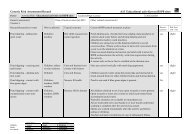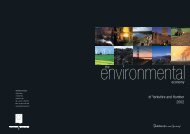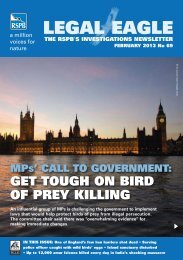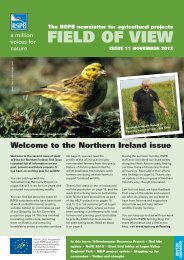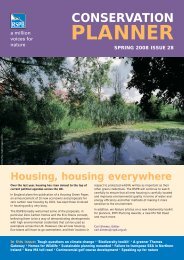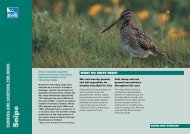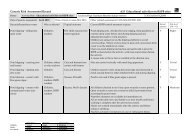'Petrel discoverer' Hadoram Shirihai - RSPB
'Petrel discoverer' Hadoram Shirihai - RSPB
'Petrel discoverer' Hadoram Shirihai - RSPB
You also want an ePaper? Increase the reach of your titles
YUMPU automatically turns print PDFs into web optimized ePapers that Google loves.
Ben Lascelles (Marine IBA Co-ordinator)<br />
Black petrel<br />
The Global Ocean Biodiversity<br />
Initiative: working towards<br />
High Seas MPAs<br />
Only 0.5% of the world’s seas have<br />
any form of protection. This is in stark<br />
contrast to the progress that has been<br />
made on land, where protected areas<br />
cover 11% of the Earth’s land surface.<br />
In 2002, global leaders at the World<br />
Summit on Sustainable Development<br />
in Johannesburg committed to<br />
achieving a global network of Marine<br />
Protected Areas (MPAs) by 2012.<br />
While some countries have advanced<br />
the identification of MPAs in their<br />
territorial waters and Exclusive<br />
Economic Zones, the open ocean and<br />
deep seas remain some of the most<br />
poorly understood and least protected<br />
places on the planet.<br />
In 2008, the parties to the Convention<br />
on Biological Diversity (CBD) adopted<br />
scientific criteria for identifying<br />
“ecologically or biologically significant<br />
areas” (EBSAs) and guidance for<br />
designing networks of protected areas<br />
in places beyond national jurisdiction.<br />
More importantly, nations also agreed<br />
to apply these criteria to identify and<br />
protect such areas.<br />
Wandering albatross<br />
(antipodean)<br />
In 2009, the Global Ocean Biodiversity<br />
Initiative (www.GOBI.org) was<br />
established to help governments to<br />
apply the EBSA scientific criteria and<br />
guidance. GOBI is an international<br />
scientific collaboration facilitated by the<br />
International Union for Conservation<br />
of Nature with core support from the<br />
German Federal Agency for Nature<br />
Conservation. It is designed to assist<br />
states and relevant regional and global<br />
organisations to identify EBSAs using<br />
the best available scientific data, tools<br />
and methods.<br />
BirdLife International, which joined<br />
GOBI in 2009 following the CBD expert<br />
workshop held in Ottawa, Canada, is<br />
contributing its expertise and experience<br />
relating to identifying Important Bird<br />
Areas (IBAs) in the marine environment.<br />
BirdLife has produced several case<br />
studies for GOBI of how EBSAs may<br />
be identified using seabird tracking<br />
data and a Marine IBA approach, which<br />
can be found on the GOBI website.<br />
Through GOBI, BirdLife has been<br />
promoting seabirds as excellent<br />
MARINE IBAS<br />
indicators of the state of the wider<br />
marine environment, and advocating<br />
that identifying an appropriate<br />
network of MPAs for them is likely<br />
to have significant benefits to<br />
wider marine life and help us move<br />
towards the sustainable management<br />
of the oceans.<br />
The Global Seabird Programme<br />
has plans to conduct a more<br />
complete analysis of the Global<br />
Procellariiform Tracking Database<br />
(www.seabirdtracking.org) to help<br />
identify a network of sites that are<br />
in need of protection, and promote<br />
them through relevant policy<br />
mechanisms such as CBD.<br />
The work under GOBI ultimately aims<br />
to help countries meet the CBD and<br />
World Summit on Sustainable<br />
Development goals to reduce the rate<br />
of biodiversity loss, apply ecosystem<br />
approaches and establish<br />
representative MPA networks by 2012.<br />
For further details, please contact<br />
ben.lascelles@birdlife.org<br />
Ben Lascelles (Marine IBA Co-ordinator)


